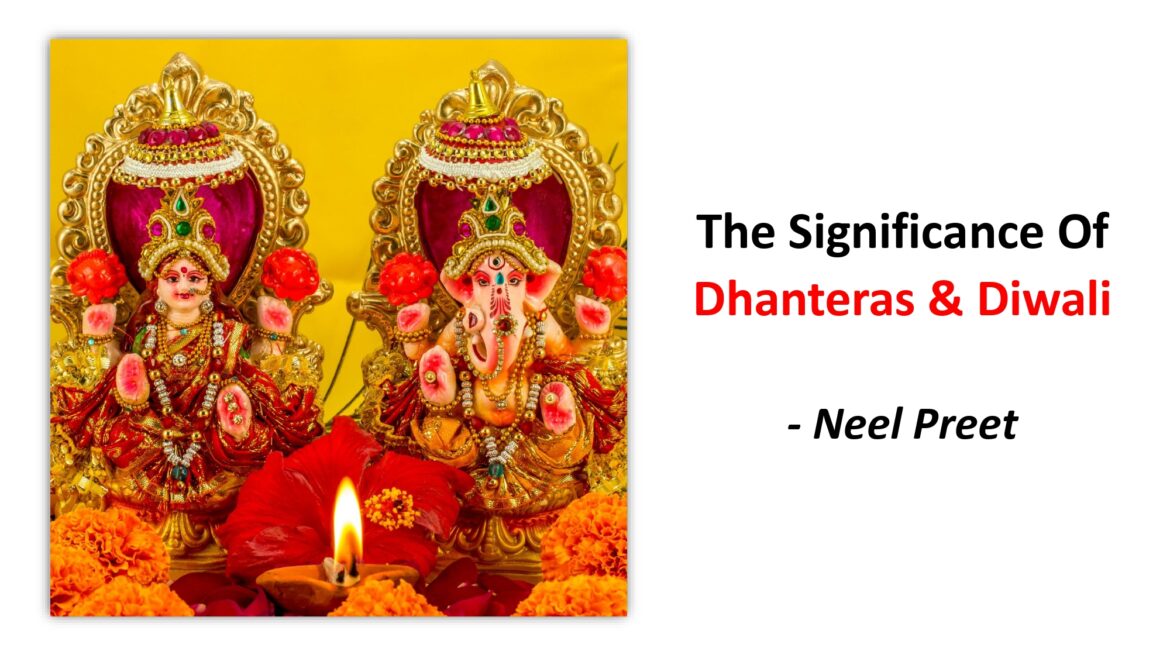Dhanteras, also known as Dhanatrayodashi is the first day that marks the festival of Diwali. It is believed to be the day when Lord Dhanvantri, who is considered as the God of Medicine or Ayurveda, (another incarnation of Lord Vishnu) took emerged with his Pot of elixir (Amrit) to heal the humankind by providing us with the strength as well as raising our awareness. The beauty of the festival of Dhanteras is that it is celebration of health, wealth & prosperity!
The word Dhan is referred to wealth and Teras is referred to Thirteenth. Summing it up, the thirteenth lunar day of the Dark Fortnight or Krishna Paksha in the Vikram Samvat Hindu Calendar month of Ashwin is the day known to be Dhanteras. In every nook and corner of India and Nepal, this festival is celebrated with great enthusiasm among the devotees. However, the rituals of celebrating Dhanteras may vary region to region, depending upon the local customs and beliefs. As we are talking about the significance of the auspicious festival of Dhanteras, it becomes necessary to note that the Indian Ministry of Ayurveda, Yoga and Naturopathy, Unani, Siddha and Homeopathy, announced to observe Dhanteras, as the ‘National Ayurveda Day’, which was first observed on 28 October 2016.
On this day, the devotees worships Mata Lakshmi, who is considered as the ‘Goddess of Wealth’ in the rich Hindu Culture. In addition, utensils and gold, silver & other kinds of jewellery are usually bought and new business deals are done on this day for more wealth and prosperity. The festival is celebrated as Lakshmi Puja, which is performed in the evenings when Diyas (lamps of clay) are lit. Bhajans, devotional songs in praise of Goddess Lakshmi, are sung and Naivedhya of traditional sweets is offered to the Goddess. On this night, the lights are set out every night both in the sky lamps and as offerings at the base of a Tulsi plant and in the form of Diyas, which are placed in front of the doorways of homes. This light is an offering to Yama, the ‘Host of Death’, to avert premature death during the time of the Diwali festival. This day is a celebration aimed at increasing wealth and prosperity!
Well, as we know that the festival of Dhanteras marks the beginning of the festival of Deepawali, let us now go through the significance of the festival of lights – the biggest festival of the Hindus, across the globe. Deepawali is not only significant because of its massive popularity and brilliant displays of fireworks but also because it symbolises the victory of light over darkness, of good over evil and of knowledge over ignorance.
On this day, Diyas, candles and lamps are placed all around the house, to ‘light’ the way to knowledge and victory. Each house is decorated with various assortments of coloured lights and Diyas. The night sky on this festival is bathed in the soft glow of light and warmth emanating from every household, making it a truly wondrous sight to behold. The celebration of Deepawali also serves as a cleansing ritual, one that signifies letting go of all of the past year’s worries and troubles and stepping into the light. In the days leading up to Deepawali, families get together to clean, renovate and decorate their respective households and workplaces with Rangolis and Diyas. Diwali marks the onset of winter and the beginning of all things new, both in nature and humanity!
On this day, celebrants dress themselves their finest, brand new clothing and offer prayers to the various Gods and Goddesses, according to their own familial traditions. The celebration of Deepawali can find its roots in ancient India and it is likely that it began as a significant harvest festival. Moreover, as with many Hindu festivals, the origins of Diwali differ from region to region, which can be vastly attributed to the culture of stories and legends being passed down through generations through the spoken word.
In addition, to all the fun, festive foods & sweets, along with the firecrackers surrounding the celebration of Deepawali, it is an inherently philosophical festival. One that places great significance on the ‘light’ and the prevalence of good over evil. This Deepawali lets us pray to the Gods to guide the humankind, bless us all with health, prosperity and happiness. Most importantly, let us all pray to the Gods to end the evil, greed, dirt & terrorism from the face of our planet & make it a safe home for the good souls!
Written By NEEL PREET – Author of the Books, Voice From The East (2016); Journey With Time Place And Circumstances (2018) & Indian Defence Files (2021).



